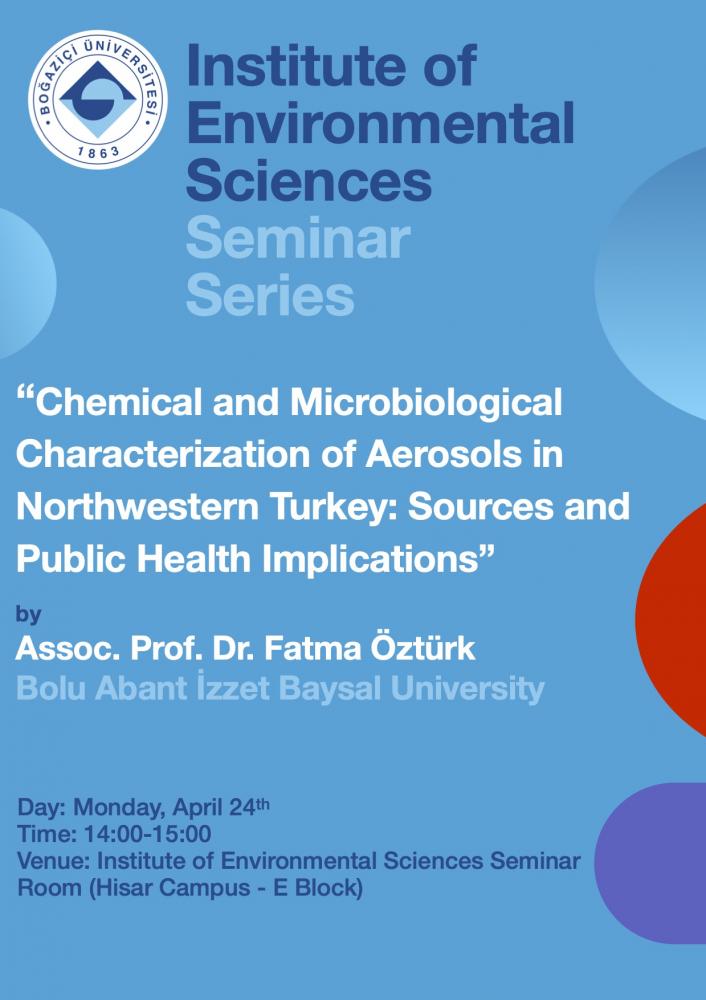IESc Seminar Series: Chemical and Microbiological Characterization of Aerosols in Northwestern Turkey: Sources and Public Health Implications - by Dr. Fatma Öztürk

Institute of Environmental Sciences Seminar Series
Chemical and Microbiological Characterization of Aerosols in Northwestern Turkey: Sources and Public Health Implications
By Assoc. Prof. Fatma Öztürk
Bolu Abant Izzet Baysal University
We cordially invite you to our seminar “Chemical and Microbiological Characterization of Aerosols in Northwestern Turkey: Sources and Public Health Implications” by Assoc. Prof. Fatma Öztürk, Bolu Abant Izzet Baysal University.
When: 24 April, Monday, 14:00-15:00
Where: Institute of Environmental Sciences Meeting Room
Contact: pinar.ertor@boun.edu.tr for any questions.
Abstract:
The composition of atmospheric aerosols is dynamic and is influenced by their emission sources, air mass transport pathways, meteorology, and topography. The characterization of such factors can improve the evaluation of air quality and health risks under different atmospheric scenarios. PM10 (< 10 µm) and PM2.5 (<2.5 µm) samples were collected at a ground-based station in Bolu between 2017 and 2018. Chemical and microbiological analyses of collected samples were performed using several techniques. Air trajectory and wind speed data were used to separate the local and distant sources. The findings revealed that a higher relative abundance of antibiotic resistance genes (ARGs) and anthropogenic ions was dominant in winter samples, which was attributed to the local industry and poultry houses located in the city. In contrast, marine and mineral dust as well as Ascomycota, were associated with air masses from distant sources. The mutagenicity of polycyclic aromatic hydrocarbons (PAHs) bound to PM2.5 samples was also assessed with the AMES test using two tester strains of Salmonella typhimurium (his-), TA98 and TA100, with and without S9 mixture for metabolic activation. Both test strains exhibited lower revertant numbers in the presence of the S9 mixture, suggesting that the metabolic activities of the PAH compounds decrease due to metabolic reactions occurring in the human body.
About Fatma Öztürk:
 Dr. Fatma Öztürk holds her BSc. and Ph.D. degrees from the Environmental Engineering Department of the Middle East Technical University (METU) in 2001 and 2009, respectively. She started working as an assistant professor in the Environmental Engineering Department of Bolu Abant Izzet Baysal University (BAIBU) in 2009. She then worked as a post-doctoral researcher at the Chemical Sciences Division of the National Oceanic and Atmospheric Administration (NOAA), CO (USA) between 2010 and 2012. She was promoted to an Associate Professor position in 2018 at BAIBU. Her field of the profession includes air quality monitoring at in-situ stations, analyses of collected particulate and gaseous phase samples by means of various analytical instruments, and interpretation of data generated using several statistical techniques to find the sources and source regions of atmospheric pollutants. Dr. Öztürk worked as a PI in many TUBITAK-supported projects, and as a researcher in several of them. She has published over 30 peer-reviewed papers and has presented at over 100 international and national conferences, workshops, and symposiums. She has supervised undergraduate and graduate students and lectured to them at the undergraduate and graduate levels.
Dr. Fatma Öztürk holds her BSc. and Ph.D. degrees from the Environmental Engineering Department of the Middle East Technical University (METU) in 2001 and 2009, respectively. She started working as an assistant professor in the Environmental Engineering Department of Bolu Abant Izzet Baysal University (BAIBU) in 2009. She then worked as a post-doctoral researcher at the Chemical Sciences Division of the National Oceanic and Atmospheric Administration (NOAA), CO (USA) between 2010 and 2012. She was promoted to an Associate Professor position in 2018 at BAIBU. Her field of the profession includes air quality monitoring at in-situ stations, analyses of collected particulate and gaseous phase samples by means of various analytical instruments, and interpretation of data generated using several statistical techniques to find the sources and source regions of atmospheric pollutants. Dr. Öztürk worked as a PI in many TUBITAK-supported projects, and as a researcher in several of them. She has published over 30 peer-reviewed papers and has presented at over 100 international and national conferences, workshops, and symposiums. She has supervised undergraduate and graduate students and lectured to them at the undergraduate and graduate levels.
